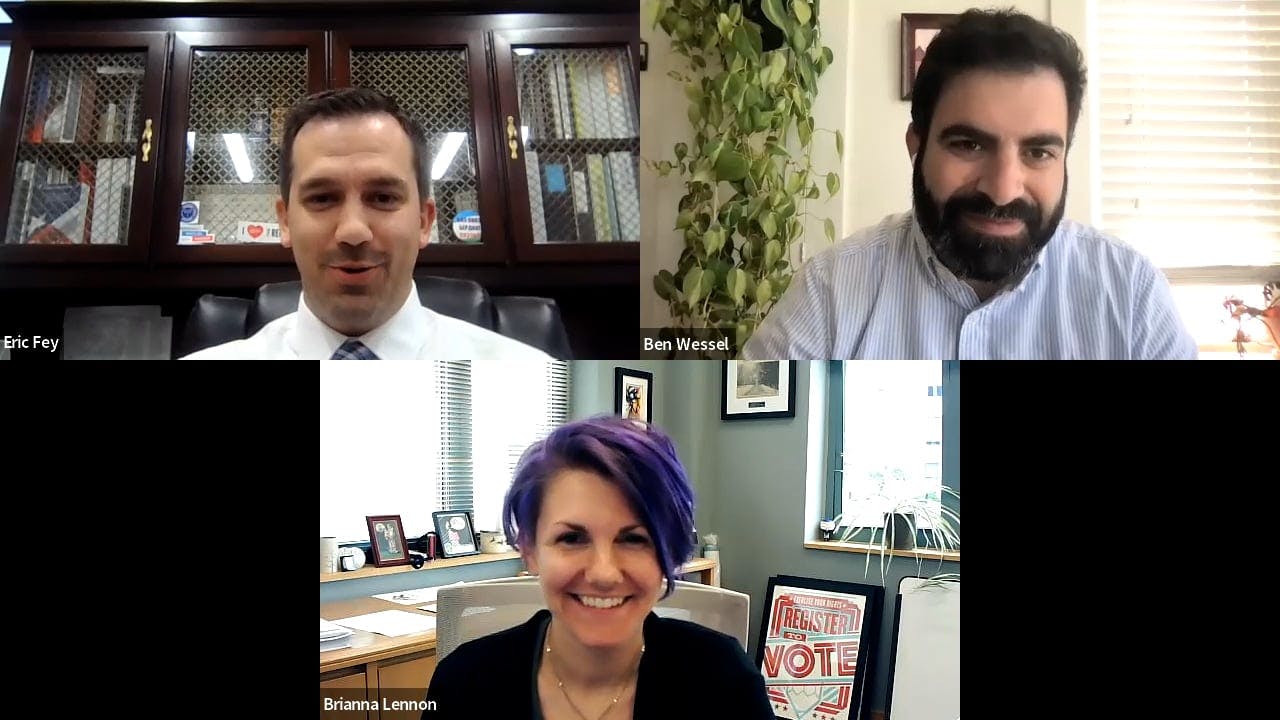
This organizer-turned-chef is reimagining the restaurant industry
56 min watch
Elections are an obvious cornerstone of American democracy, but not all of us take time to think about what—and who—it takes to run them fairly and honestly. Whether it’s finding poll locations, recruiting judges, double checking ballots, or researching cyber security, the tasks of local administrators are vast and varied, and not all officials are given the resources and support they need to thrive. In fact, many are leaving their positions, due to partisan attacks, threats, harassment, and other pressures of the job.
Emerson Collective Fellows Brianna Lennon and Eric Fey are working to help advocate for change in the election landscape. As elections officials in Missouri, they don’t just run great elections—they are also dedicated to helping people understand what election administrators actually do. To create a platform for exchange, Fey and Lennon launched the excellent, informative podcast High Turnout Wide Margins, which is focused on professional development and connection within the election official community. The second season premiered in April.
Fey and Lennon recently joined Ben Wessel, Emerson Collective’s Director of Campaigns, for Fellows Friday to share their on-the-ground experiences, visions for bettering the future of election administration, and tips on what Americans can do to support fairness and trust in the election system.

FELLOWS FRIDAY SERIES: Election administrators Brianna Lennon and Eric Fey speak to the crucial role of local election officials in maintaining a just democracy.
Brianna Lennon: Right now, it's a little stressful, because we just received our congressional maps for redistricting. A lot of my days have been spent looking at maps and making sure that voters will get the right ballots and be put in the right districts. We’re figuring out the best way to recruit enough election judges for the August election. And we’re working through all the little pieces of the puzzle that fit together on Election Day: A voter gets a ballot, a voter has a place to cast their ballot, we have election judges there to help them, and we need to have everything ready to go so it can be tabulated on election night. It's all preparation right now.
Eric Fey: Election administration is very local, it’s divided up locally across the country. There are something like 8,000 to 10,000 election administrators. In more rural areas of the United States, where most election administrators are, we also handle other things, like managing the tax books, liquor licenses, auctioneer licenses, and payroll. But in a major area, officials are serving so many voters and the spotlight is on us so much more. We have to know all about cyber security. We’re working with the Department of Homeland Security constantly. We're having talks with the postal service at a very high level. It gets a little more intense in a different way in a major metropolitan area. But in a more rural area, you're dealing with everything. It's no less stressful—it's just a different kind of stress.
ERIC FEYWhen people ask me, ‘What do you do when there's not an election?’ I say, ‘There's never not an election.’
Brianna Lennon: Our country is unique in the way that we do our elections, to have it so decentralized. The risk is that you don't know how little experience or preparation your weakest link has in a decentralized system. If there was some way to make sure that everyone has a base layer of training and understanding, and to allow them to tap into the resources and experience that many people have—that's the biggest thing I'd like to change.
Eric Fey: With the decentralized system we have, we do forego efficiency and standardization, versus a more centralized system like a lot of places in Europe. However, we do have a much more responsive election administration system, where each election administrator can tailor the administration to the unique needs of the people that live in that locale. If anything good came out of the 2000 Florida debacle, it was an increased importance put on the professionalization of election administration. What I would like to see is people continuing to realize that this is a profession. I think that would go a long way in improving election administration in the United States.
Eric Fey: If you put yourself in the shoes of a county clerk, after the 2020 election, all of a sudden you're getting these questions, you're getting doubts, people from the political parties are putting all the scrutiny on you. And a lot of these folks don't get paid very much money.
Brianna Lennon: The other thing is the resources, not just the salaries. You're not provided any additional resources every time you have something new to take on. When cybersecurity became a new thing to bring on in 2016, we didn't get a bunch of computers and IT resources. We were just told, "This is now something that you do.” Every major election since 2016 has added more challenges. Even if it's not the politicization, people are just drowning in the stuff that needs to get done. If counties can't afford additional resources to open a new polling place, or put things in like no-excuse absentee voting for two weeks, that's what leads to people getting really demoralized and not wanting to do the job anymore.
BRIANNA LENNONEvery major election since 2016 has added more challenges. Even if it's not the politicization, people are just drowning in the stuff that needs to get done.
Eric Fey: In my opinion, 2020 was nailing it. There's never been a perfect election administratively. There will be administrative hiccups in almost every election, in almost every jurisdiction, but I'm very confident saying there's never been a more secure or accurate election than there was in November of 2020.
Brianna Lennon: 2020 was incredibly well done. Missouri's election was incredibly well done, partly because we changed policies to allow us to create better outcomes for voters. Thirty percent of our voters voted in advance of Election Day, which allowed everybody else to have a better experience on actual Election Day during COVID, and we still had all our ballots counted in time. You have to ask: What are the things that actually work in the world that we live in now? People are transient and don't necessarily need to vote close to their home; they might want to vote closer to their work. People might not want to go anywhere [due to a global pandemic], so having ballots mailed to them is helpful. Having a robust election system that is administered well leads to better outcomes for voters.
Brianna Lennon: One of the things I will try to do in 2023 is set up more data collections, so we can make more informed decisions instead of relying on anecdotal experience. Then, taking stock of what worked in 2022 that we want to emulate, and what didn't. I’ll also be trying to get a pulse on what other counties in our own state are planning to do for 2024 and seeing where we can work together.
Eric Fey: After an election is over, we're into the nuts and bolts stuff. We’re going to need to buy new electronic poll books when they're at the end of their life. Voter list maintenance is an ongoing, everyday project. We're constantly planning and preparing for the next election. When people ask me, "What do you do when there's not an election?" I say, "There's never not an election."